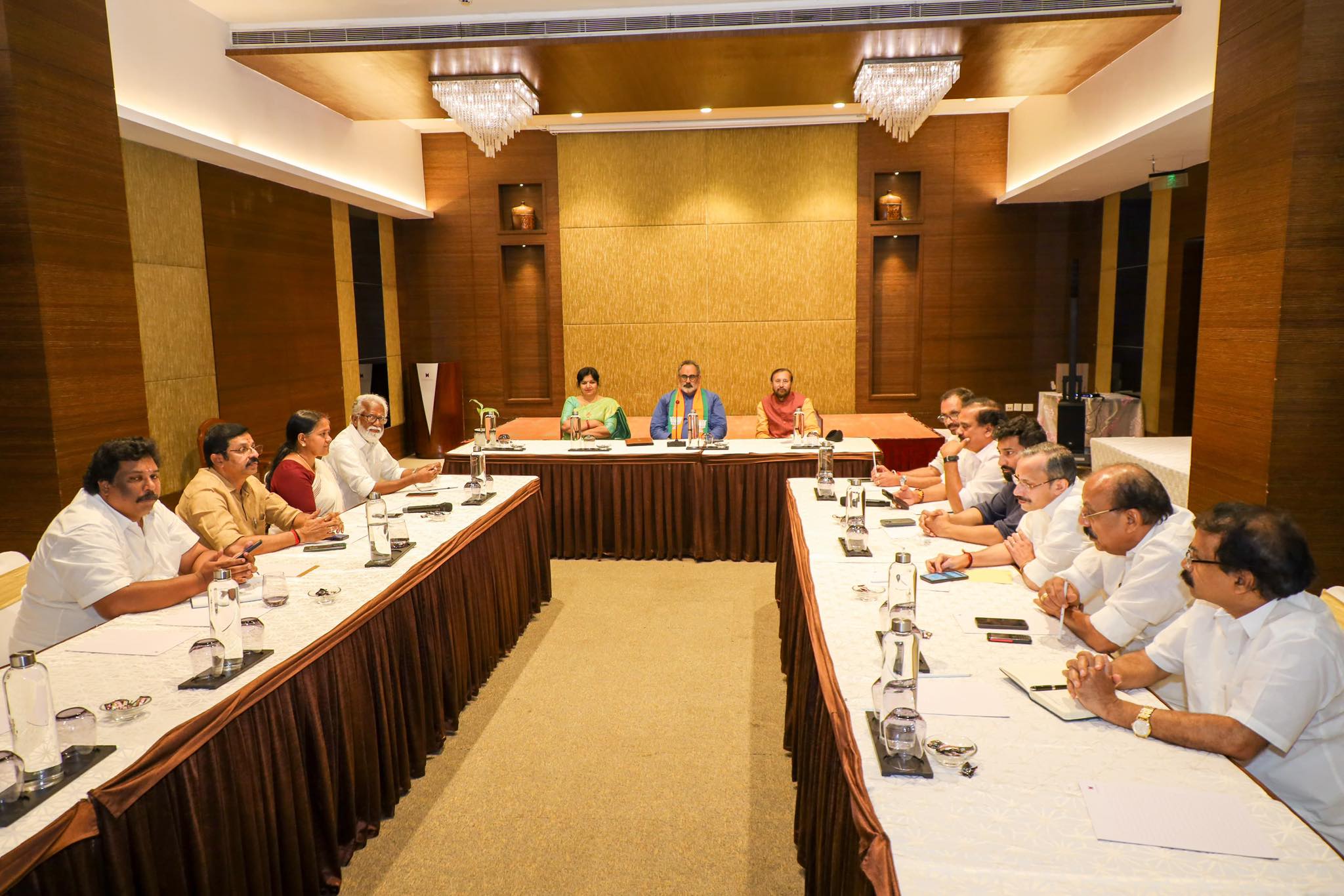Publicly, the BJP state unit hails Rajeev’s appointment as a much-needed boost for the party. However, behind closed doors, murmurs of scepticism grow louder.
Published Mar 26, 2025 | 11:47 AM ⚊ Updated Mar 26, 2025 | 11:47 AM

After taking charge as the state president, Rajeev Chandrasekhar chaired his first state core group meeting on 24 March.
Synopsis: Rajeev Chandrasekhar was appointed the chief of Kerala BJP on 23 March. Rajeev steps into his role as an outsider — both politically and ideologically. His biggest test will be rallying a somewhat fractured state unit and delivering tangible electoral gains in the upcoming local body and Assembly polls.
In what many within the BJP describe as a “surgical strike,” the party’s central leadership sprang a surprise on 23 March by appointing technocrat-turned-businessman-turned-politician Rajeev Chandrasekhar as its state president of Kerala.
His elevation came at the cost of sidelining several senior leaders and seasoned party heavyweights, signalling the BJP’s intent to shake things up in a state where its electoral fortunes have long remained stagnant.
Publicly, the BJP state unit hails Rajeev’s appointment as a much-needed boost for the party. However, behind closed doors, murmurs of scepticism grow louder.
Can a political novice — unseasoned in Kerala’s high-octane electoral battleground — successfully navigate the deep, often turbulent waters of the state’s politics?
Insiders warn that while the leadership might claim calm after the storm of his appointment, Rajeev will have little time to settle in. Two immediate and formidable challenges loom large: The local body elections and the high-stakes Assembly polls.
For the newly minted BJP state chief, the baptism by fire begins now.
Rajeev’s journey spans cutting-edge technology, entrepreneurship, and politics.
Born in a Malayali family in Ahmedabad in Gujarat, Rajeev Chandrasekhar spent his early years across India, as his father served as an Air Commodore in the Indian Air Force. He pursued engineering at the Manipal Institute of Technology before earning an MS in Computer Science from the Illinois Institute of Technology, the US.

Rajeev at Raisina Dialogue in New Delhi on 19 March where he delivered speech on geopolitics and geo-economics.
Chandrasekhar began his career as a software engineer before joining Intel, where he worked as a design engineer and CPU architect on the groundbreaking 80486 and Pentium processors. His expertise in microcomputers, early internet technologies, compilers, and Unix systems laid the foundation for his future as a tech entrepreneur and policymaker.
In the early 1990s, he returned to India to build BPL Mobile, pioneering India’s cellular revolution.
Under his leadership, BPL Mobile became India’s largest telecom network, spanning Maharashtra, Kerala, Tamil Nadu, and beyond.
His advocacy helped shape key reforms, including the creation of TRAI (Telecom Regulatory Authority of India) and the landmark New Telecom Policy of 1999.
In 2005, he exited BPL Mobile in India’s first billion-dollar tech deal.
A three-term MP, Rajeev played a crucial role in tech, innovation, and governance policymaking. As a Union minister from 2021 to 2024, he drove India’s Digital India mission, artificial intelligence (AI), data privacy, and entrepreneurship.
His first Lok Sabha bid in 2024 from Thiruvananthapuram saw him lose to Shashi Tharoor by 16,077 votes.
He is a man who is no stranger to controversy, finds himself at the centre of multiple political and financial storms.
Accusations of concealing vast portions of his wealth have dogged him since his 2018 Rajya Sabha affidavit, where critics alleged he left out his billion-dollar investment firm, Jupiter Capital.
The controversy resurfaced during his high-stakes 2024 Lok Sabha battle in Thiruvananthapuram, with the Congress urging the Election Commission to investigate possible financial discrepancies.
His fiery rhetoric has also landed him in legal trouble.
In 2023, following the blasts at a Jehovah’s Witnesses convention in Kalamassery near Kochi, he was booked for allegedly stoking religious tensions with his “Hamas Jihad” remarks.
This elicited a sharp response from Chief Minister Pinarayi Vijayan as he remarked that Rajeev is nothing but ‘spewing deadly poison’.
Again, in 2024, his claims about India’s changing demographics drew widespread criticism for allegedly fuelling communal polarisation.
His media investments have further sparked debate. His funding of Republic TV through Asianet News raised concerns about BJP-friendly narratives and conflicts of interest.
Adding to his list of past disputes is a long-running legal battle he had with his father-in-law over the management of BPL Group.
On 9 June 2024, after his defeat to Shashi Tharoor in the Thiruvananthapuram Lok Sabha election, Rajeev seemingly bid farewell to active politics. His social media post declared: “Today, curtains down on my 18-year stint in public service… I certainly didn’t intend to end it with an electoral loss, but that’s how it’s turned out.”
The statement fuelled speculation about his political future, especially after he was left out of the NDA ministry lineup.
However, he retracted the post soon, attributing it to an intern’s miscommunication. Clarifying that only his tenure as MP and minister had ended — not his political career — he reaffirmed his commitment as a BJP karyakarta (worker).
Months of relative silence in state politics followed, but by February 2025, he began actively commenting on key Kerala issues, from the Munambam Waqf land dispute to the state’s financial crisis and the protest by Accredited Social Health Activists (ASHAs).
Then, in a dramatic twist in the second week of March, he publicly declared himself a contender for the BJP’s Kerala president post, hinting at an imminent leadership change.
“I also have a chance like everyone else,” he said, triggering intense speculation about a shake-up in the state unit, where K Surendran has completed five years at the helm.
A week after he assumed charge as state president.
As the newly appointed BJP Kerala president, Rajeev steps into his role as an outsider — both politically and ideologically.
With no deep-rooted association with the party or the Rashtriya Swayamsevak Sangh (RSS), except being a three-time Rajya Sabha MP, BJP’s Vision 2025 Committee convenor, NDA Kerala vice chairman for 2016 Elections, media and communication in-charge for 2018 Karnataka Elections, 2019 Lok Sabha elections, member of BJP Manifesto Committee for 2019 Elections, co-in charge of 2021 Puducherry elections and as a candidate during the 2024 Lok Sabha Elections, Rajeev has largely remained distant from the dust and rubble of daily politics.
While party insiders believe that Rajeev, a technocrat and businessman, could inject fresh ideas and appeal to young voters, his biggest challenge will be winning over the party’s core cadre.
His speech on 24 March revealed linguistic struggles, and his personal narrative failed to make a strong impact.
Even though he is expected to adapt over time, his real test lies in unifying the party’s senior leaders, factions, and grassroots workers.
The central leadership may have picked him as a neutral figure beyond the party’s internal rivalries but Rajeev must now stitch together these factions under a cohesive vision.
“Beyond rhetoric, he needs a strategic approach — focusing on incremental wins rather than lofty claims of securing power. With local body elections around the corner, his leadership will be closely scrutinised, as the party’s performance there will set the stage for the 2026 Assembly polls,” a district leader of the BJP told South First on condition of anonymity.
The appointment has drawn sharp reactions from rival political parties, with leaders dismissing his ability to revive the party’s fortunes in the state.
CPI State Secretary Binoy Viswam took a dig at the BJP’s leadership choices, stating that even Rajeev, a corporate heavyweight, would be unable to rescue the party in Kerala.
“None, let alone Rajeev Chandrasekhar, can help the BJP in Kerala. Corporate heads are now at the helm of the party, so his appointment doesn’t surprise me,” Viswam told the media.
He acknowledged knowing Rajeev from their time in Parliament and described their personal equation as friendly but remained unconvinced about his political impact.
“His business acumen won’t work in Kerala’s political landscape,” he remarked, questioning whether the new BJP chief could curb the alleged flow of black money within the party.
Echoing similar sentiments, KPCC General Secretary (Organisation) M Liju dismissed Rajeev’s elevation as a mere extension of “crony capitalism.”
Speaking to South First, he remarked, “His appointment is just another instance of businessmen using the BJP as a launchpad for their interests. Right-wing circles claim he will attract young voters, but as an MP and Union Minister, what has he done for them? For the Congress, he poses no threat. A new president won’t change the BJP’s fate in Kerala.”
In short, his appointment aims to disrupt the status quo but comes with significant risks. While his credentials as a technocrat and entrepreneur bring a fresh perspective, his lack of grassroots political experience in Kerala could prove to be a stumbling block.
His biggest test will be rallying a somewhat fractured state unit and delivering tangible electoral gains in the upcoming local body and Assembly polls.
It remains to be seen if he will merely become another fleeting experiment or one could transform BJP’s stagnant fortunes in Kerala.
(Edited by Muhammed Fazil.)
